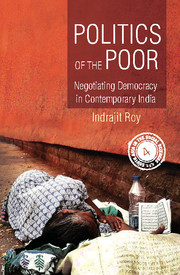Book contents
- Frontmatter
- Contents
- List of Tables, Map and Charts
- Acknowledgements
- Glossary
- Acronyms
- Introduction: Against False Binaries
- 1 The Perspectives of the Study: Towards an Agonistics of Democracy
- 2 Political Spaces: Institutional Opportunity Structures
- 3 Political Spaces: Social Relations of Power
- 4 From Clientelism to Citizenship?: The Politics of Supplications
- 5 From Moral Vocabularies to Languages of Stateness?: The Politics of Demands
- 6 From Backwardness to Improvement?: The Politics of Disputation
- 7 From Tradition to Modernity?: The Politics of Imagination
- Conclusion: The Politics of the Poor: Agonistic Negotiations with Democracy
- Annexure 1 The Dramatis Personae, 2009–10
- Annexure 2 The Census Survey
- Annexure 3 The Multidimensional Poverty Index
- Annexure 4 Schedule for BPL Census 2002
- Annexure 5 Schedule for BPL Census 2002 West Bengal
- Annexure 6 BPL Cutoff List for West Bengal
- Bibliography
- Index
Annexure 2 - The Census Survey
Published online by Cambridge University Press: 03 August 2019
- Frontmatter
- Contents
- List of Tables, Map and Charts
- Acknowledgements
- Glossary
- Acronyms
- Introduction: Against False Binaries
- 1 The Perspectives of the Study: Towards an Agonistics of Democracy
- 2 Political Spaces: Institutional Opportunity Structures
- 3 Political Spaces: Social Relations of Power
- 4 From Clientelism to Citizenship?: The Politics of Supplications
- 5 From Moral Vocabularies to Languages of Stateness?: The Politics of Demands
- 6 From Backwardness to Improvement?: The Politics of Disputation
- 7 From Tradition to Modernity?: The Politics of Imagination
- Conclusion: The Politics of the Poor: Agonistic Negotiations with Democracy
- Annexure 1 The Dramatis Personae, 2009–10
- Annexure 2 The Census Survey
- Annexure 3 The Multidimensional Poverty Index
- Annexure 4 Schedule for BPL Census 2002
- Annexure 5 Schedule for BPL Census 2002 West Bengal
- Annexure 6 BPL Cutoff List for West Bengal
- Bibliography
- Index
Summary
The survey was conducted in two phases. In the first phase, census data was collected from nearly 4,500 households in 18 wards of the two states. The survey response structure elicited nominal responses. However, the codes were treated ordinally. Based on the analysis of this data, in-depth interviews were conducted with 500 households in four purposively selected localities. Probability samples for West Bengal were generated at 7.3 per cent error level and 90 per cent confidence levels. Probability samples for Bihar were generated at 6 per cent error level and 90 per cent confidence levels. In the survey, the response structure elicited nominal as well as open-ended responses. The codes were treated nominally and categorically. The data was analysed using the STATA software package.
The survey data
The survey instrument included each of the 13 questions (12 in the case of West Bengal) mandated in the Planning Commission's survey schedule. It also included the MPI that were at that time being developed by the OPHDI for the UNDP Human Development Report (Alkire and Santos, 2010). In addition, it also drew on the questions framed for the BPL survey proposed by Mehrotra and Mander (2009) and the Destitution Questionnaire developed by the Right to Food campaign in India (RTF, 2002). The survey schedule specifically asked whether the respondent household possessed a BPL card or not. The survey instrument was administered in the local dialect.
The survey response coding structure followed the cardinal response variables used by the Planning Commission's BPL survey. This harmonization facilitated the calculation and- subsequently- the assignment of a score to each surveyed household in accordance with the guidance issued by the Commission. The response variables for questions not corresponding with those on the official BPL survey, but drawing on the MPI were coded using the dichotomous variables (0/1) used by that index. Where the questions were such that they corresponded to both methodologies, the response format followed the cardinal treatment accorded to the data by the Planning Commission, since it was easier to dichotomize cardinal data.
Recruitment and training of investigators
The investigators were recruited from among a pool of NGO workers. In both States, my local NGO contacts recruited them on the basis of previous work experience, familiarity with local dialect, and ability and willingness to work in rural areas for extended periods of time.
- Type
- Chapter
- Information
- Politics of the PoorNegotiating Democracy in Contemporary India, pp. 434 - 440Publisher: Cambridge University PressPrint publication year: 2017

